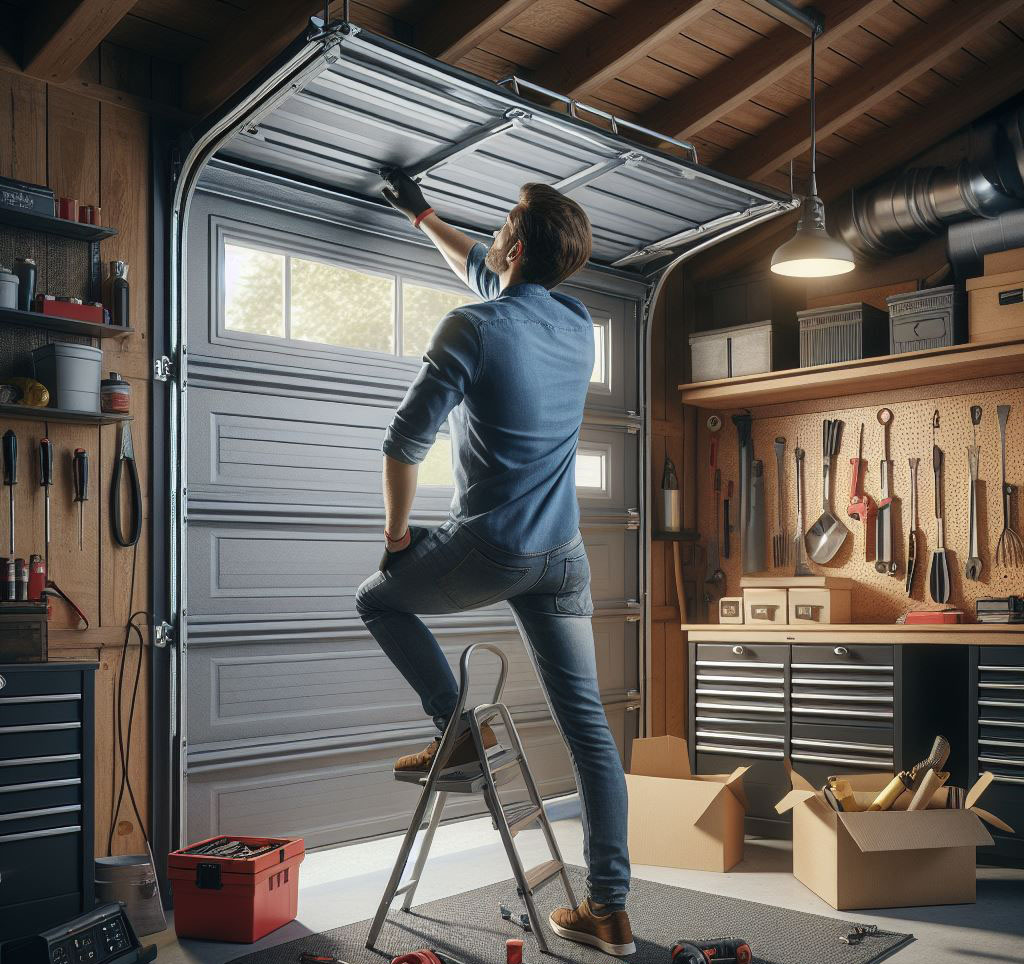In the grand scheme of home renovation, the garage door might not seem like the star of the show. But, make no mistake, the garage door springs are crucial. They’re the unsung heroes that make the difference between a door that operates smoothly and one that’s a constant headache. Think of them as the essential gears in a well-oiled machine.

Types of Garage Door Springs
- Torsion Springs: Mounted above your garage door, these springs are all about balance and torque. When your garage door closes, the springs wind tightly, storing energy. Then, as you open the door, this energy is released, aiding in lifting the door. It’s a beautiful example of simple physics at work, providing efficiency and reliability.
- Extension Springs: Running along the tracks, these springs operate on a principle of extension and retraction. As the door closes, the springs extend, storing energy. When opening, they retract, releasing the energy to assist in lifting the door. They’re akin to a slingshot, providing that necessary pull.
Torsion vs. Extension: The Showdown
When comparing these two types, it’s all about understanding their mechanics:
- Durability: Torsion springs generally outlast their counterparts due to better load balancing and higher cycle durability.
- Safety: Torsion springs offer a safer option. If they break, they usually stay put on the bar, reducing the risk of accidents. Extension springs, if not maintained, can break free and become hazardous.
- Smoothness: Torsion springs provide a smoother operation, reducing strain on the motor and other components.

Average Lifespan of Garage Door Springs
Now, let’s talk longevity. Just how long can you expect your garage door springs to last?
- The Lifespan: Typically, torsion springs can endure 15,000-20,000 cycles, while extension springs have a shorter lifespan of about 10,000 cycles. However, it’s not just about cycles, it’s about care and usage.
- Factors Influencing Lifespan:
- Usage: Frequent use can shorten a spring’s life. It’s the wear and tear principle.
- Maintenance: Regular lubrication and inspections for rust or damage can extend their life.
- Quality: Opting for higher quality springs can be cost-effective in the long run. They might cost more initially, but they save you from frequent replacements.
In conclusion, your garage door springs might seem like just another part of the house, but they demand your attention and care. A proactive approach in their maintenance can save you from a lot of hassle and unexpected repair costs in the future. Remember, a smoothly operating garage door is a sign of well-maintained springs.
Signs of Wear and Tear
In the world of home maintenance, being proactive is key, and this is especially true for garage door springs. These components don’t suddenly stop working, they show warning signs. It’s crucial to recognize these signs early to avoid potential hazards or costly repairs.
- Noises During Operation: Pay attention to any unusual noises – creaking, groaning, or squeaking. These sounds can indicate that the springs are under excess stress or are starting to wear out.
- Difficulty in Operation: If your garage door is moving slower than usual, or if it seems to struggle when opening or closing, this can be a sign that the springs are losing their strength.
- Visible Gap in Torsion Spring: A clear sign of a broken torsion spring is a visible gap, typically around an inch wide. This gap indicates that the spring has failed and needs immediate replacement.
- Rust and Corrosion on the Springs: Regularly inspect the springs for rust and corrosion. These conditions not only weaken the spring but also increase the risk of the spring breaking.
- Door Sagging at Sections: Particularly with extension springs, if you notice the door sagging at certain points when it’s open, it suggests that the springs are not supporting the door evenly.
Maintenance Tips to Extend Spring Life
Consistent maintenance can significantly extend the life of your garage door springs. Here are some key practices to keep them in optimal condition:
- Regular Lubrication: Use a silicone-based lubricant on the springs at least twice a year. This not only ensures smooth operation but also prevents rust.
- Tightening Loose Components: Over time, the hardware associated with your garage door can become loose. Periodically check and tighten any loose bolts and screws to ensure everything is securely in place.
- Perform a Balance Test: Disconnect the automatic opener and manually lift the door halfway. A well-balanced door should stay in place, partially open. If it falls or shoots upwards, it’s an indication that the springs need adjustment.
- Inspect the Cables: Look for signs of wear or fraying on the cables that accompany the springs. If you notice any damage, it’s advisable to seek professional help, as these cables are under high tension and can be dangerous.
- Schedule Professional Inspections: Even with regular personal maintenance, an inspection by a professional every couple of years is advisable. They have the expertise to identify issues that might not be obvious to a homeowner and can help avert more significant problems in the future.
By adhering to these maintenance practices, you can ensure the longevity and smooth operation of your garage door springs, safeguarding your home and avoiding unnecessary expenses.
Garage Spring Repair and Replacement
In the realm of home renovation, understanding when to repair or replace garage door springs is a crucial skill. It’s about assessing the situation with a practiced eye and making a decision based on safety and efficiency.
- When to Repair or Replace: The key here is to observe. If you notice excessive noise, significant wear, or a visible gap in the torsion spring, it’s time to act. A broken spring is a clear indicator that replacement is necessary. Remember, safety is paramount.
- DIY vs. Professional Repair: This decision requires honest self-assessment. Replacing garage door springs involves handling high-tension components, which can be dangerous. If you have the skills and the right tools, it can be a DIY project. However, for most homeowners, enlisting the services of a professional is the safer and more efficient choice.
Advancements in Garage Door Spring Technology
The field of garage door springs has seen significant advancements, reflecting a commitment to safety, durability, and user-friendliness.
- Latest Developments: Modern innovations include springs designed for higher durability and safety, such as corrosion-resistant materials and wear indicators.
- The Shift to Modern Springs: Moving from traditional to contemporary spring systems offers numerous benefits. Modern springs are engineered for higher cycle life and provide enhanced balance, leading to smoother operation of the garage door.
FAQ Section
The lifespan of garage door springs varies, with torsion springs generally lasting 15,000-20,000 cycles and extension springs about 10,000 cycles. However, this can be influenced by factors such as frequency of use, maintenance practices, and environmental conditions.
Replacing garage door springs can be a DIY project for those with the necessary experience and tools. However, due to the potential risks associated with the high tension of the springs, it is often advisable to hire a professional.
Indicators of failing springs include unusual noises, visible gaps in torsion springs, uneven lifting, and signs of rust. These signs suggest it’s time to consider repair or replacement.
Absolutely. Springs vary in quality, with higher-quality options typically offering longer life and improved performance. Investing in good-quality springs is advisable for long-term efficiency and safety.
Weather conditions, particularly extreme temperatures and humidity, can affect the integrity of garage door springs. Cold can make springs brittle, heat can accelerate wear, and humidity can lead to rust. Regular maintenance can help mitigate these effects.
